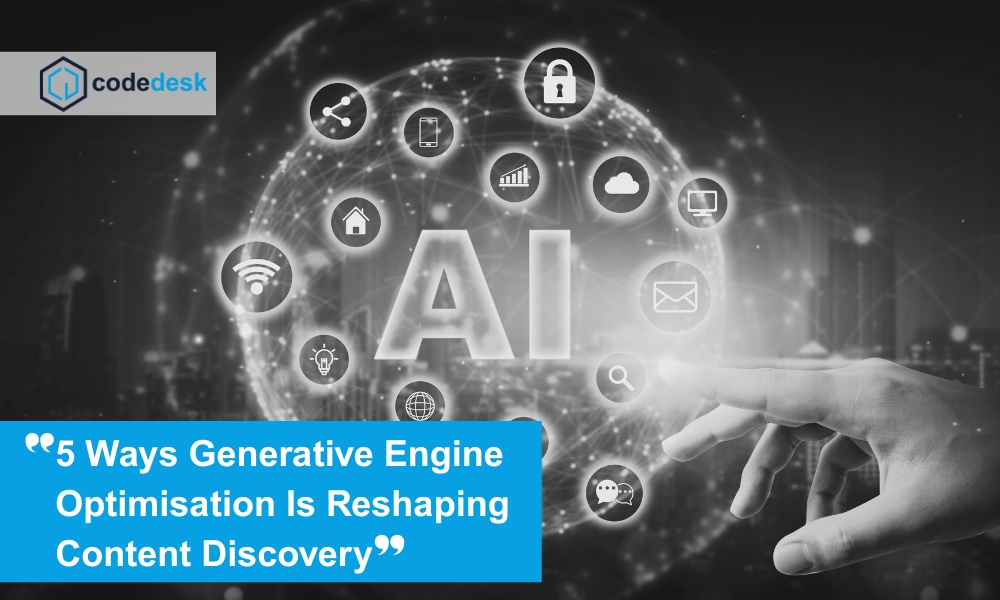The rise of AI-generated answers is changing how people find your brand
Search has changed throughout time. In 2025, generative technologies such as ChatGPT, Gemini, Claude, and Perplexity are providing users with answers instead of relying just on conventional Google results.
These websites summarize the internet and only display a small portion of the available content. That means one thing for companies and SEO experts: You are invisible if these AI models aren’t seeing or citing your content.
The new content strategy frontier known as Generative Engine Optimisation (GEO) is centered on exposure inside AI-generated solutions rather than just rankings.
What is Generative Engine Optimization (GEO)?
The process of organizing, creating, and formatting content such that large language models (LLMs) can use it is known as generative engine optimization. Unlike conventional search engines, these models interpret meaning, extract data, and produce natural language responses rather than crawling web pages.
GEO concentrates on citation and inclusion in AI answers, whereas standard SEO concentrates on exposure in search results. This distinction is important. The most effective material in generative contexts is not only keyword-rich but also factual, short, structured, and contextually complete.
Why GEO is important now
The use of generative search is growing in popularity. Gemini is integrated into all Google services, and ChatGPT boasts more than 180 million monthly users, according to Statista. In the meantime, enterprise software, operating systems, and browsers are incorporating Meta’s LLaMA paradigm and Microsoft’s Copilot. The way individuals search is being altered by these tools:
- Rather than using brief keyword phrases, they pose comprehensive queries.
- They prefer direct responses over ten links.
- They use more than simply web results; they also use summaries.
Your material will be skipped if it is not formatted to feed these engines.
5 Ways Generative Engine Optimisation is Changing Content Discovery
1. Content Is Adapted to AI, Not Just People
The way AI perceives content differs from that of humans. It analyzes factual density, parses language, and favors informative and well-structured content. A 600-word guide that addresses particular questions will outperform a 2,000-word blog article full of filler.
What this implies:
- Well-labeled, unambiguous headings are important.
- A paragraph should be brief and targeted.
- Performance is weakened by redundant filler.
AI models can more readily extract valuable insights to incorporate into their responses when the structure is better.
2. Concepts Are Developing From Keywords
GEO necessitates a more semantic approach, whilst traditional SEO still mainly depends on keywords. Relationships between entities and concepts, not repetition, are how LLMs comprehend subjects. Optimisers are now writing for concepts like this rather than simple terms like “best running shoes.”
- Technology for cushioning
- Styles of running
- Compatibility of foot shapes
Example:
Because it addresses user intent in a way that AI can summarize and quote, a blog article titled “What Makes a Great Running Shoe for Flat Feet?” might do better than a listicle packed with keywords.
3. User Queries Are Becoming Conversational
Today’s searchers — especially younger users — are treating AI tools like human assistants. They ask questions like:
> “I’m going to Berlin next week. What’s a chill, cheap area to stay in?”
Generative engines prefer content that sounds like it belongs in a conversation. This means:
- Addressing readers directly
- Breaking content into Q&A sections
- Including real-world use cases
Pro Tip:
Using subheadings like “What if I’m a first-time visitor?” or “How much should I budget?” mirrors how people actually think and ask questions.
4. Ranking Logic Is Changing Due to Real-Time Personalization
Responses are frequently customized by generative platforms according to context, including location, surfing history, tone, and even platform activity. If you type a query in Gemini while logged into Gmail, it may return a different answer than if you type the same query in ChatGPT.
This gives content discovery a layer of personalization that traditional SEO tools are unable to monitor.
These days, GEO-friendly content strategies consist of:
- Developing different content use cases
- Comparing the user levels of novices and experts
- Using language appropriate for various audiences or goals
Giving the AI choices increases the likelihood that a portion of your material will be appropriate for the particular context for which it is being generated.
5. AI Summaries and Search Snippets Are the New Front Page
The action is no longer on Page One, so forget about it.
Users of today frequently never go to the search results. Rather, their AI helper provides them with a comprehensive synopsis or response. One or two sources are frequently cited, paraphrased, or linked in these summaries.
You’re losing authority in addition to visibility if your work isn’t being cited. To make these AI snippets more efficient:
- Make use of bullet points and numbered lists.
- Add definitions, data, or quotes from experts.
- Use a schema to mark up content to show structure.
Instead of sensational headlines or ambiguous promises, AI favors material that is clear, authoritative, and factual.
Geoptie: The Geo-Powered Toolkit Every SEO Needs in 2025
With its collection of free geo-tools made especially for SEO experts, Geoptie is spearheading the movement as search becomes more location-aware. To assist advertisers in optimizing for hyper-local searches, the platform provides precision-driven solutions such as IP geolocation, geo-based keyword suggestions, and local intent mapping.
Geoptie’s Geo Keyword Generator, which finds popular search terms in particular cities or areas, is one of its most notable features. Businesses looking to dominate Google’s Map Pack or target numerous local markets may find this very helpful.
Geoptie fills the gap between localized accuracy and worldwide SEO strategy when used in conjunction with tools like IP location monitoring and domain-level geo analytics. Platforms like Geoptie make sure your content remains relevant in a world where AI-generated search results prioritize user intent and location context—not only globally but on the block.
How content creators are adapting
Agencies and content teams are shifting from keyword spreadsheets to semantic frameworks, answer banks, and AI prompt testing.
Writers now think like prompt engineers:
“How would ChatGPT respond if a user asked about this topic — and is my brand part of that answer?”
That simple question is now a litmus test for content effectiveness.
The role of monitoring tools in GEO
A number of new technologies have been introduced to assist marketers in measuring the visibility of AI, such as:
- Mangools AI Search Grader:Check the frequency of your brand’s appearance in AI results with Mangools AI Search Grader.
- AthenaHQ monitors references in responses produced by AI.
- Hall by UseHall Logging generating results for both branded and unbranded searches is what Hall by UseHall does.
Although these technologies are still in their infancy, they are quickly becoming essential for comprehending the AI layer’s existence of your material.
Why GEO is more important than SEO
Conventional SEO will still be important, particularly for transactional intent and commercial terms. However, in the era of AI solutions, GEO emphasizes knowledge, authority, and information relevancy. Consider GEO as an additional track, not a substitute. Search engine traffic is still important, but you also want to have an impact on AI narratives. You’re excluded from the discourse if you don’t contribute to those responses, and the most active users are now there.
Code Desk is one agency using GEO early
GEO is incorporated into every campaign at Code Desk, a leading top digital marketing agency in UK, rather than being viewed as a passing fad. Content produced by their authors and strategists is intended to appear in ChatGPT’s answers, Gemini summary, and AI snapshots on various platforms. Code Desk assists businesses in moving past Page One and into the answers themselves by emphasizing clarity, contextual coverage, and entity-based content frameworks.
What does GEO have planned for 2025 and beyond?
Though it’s only the beginning, GEO is already changing its approach to content strategy. In the future, we can anticipate:
- More AI systems that use real-time web material
- Citations and brand references are becoming more significant.
- Increasingly, GEO audits are using AI analytics techniques.
- Improved compatibility between search engines and browsers and AI assistants
Your visibility will rely more on relevance, structure, and authority than rank as generative search gets integrated into devices, apps, and processes.
Final Thoughts
In the era of AI search, brands that wish to expand must implement generative engine optimization. It goes beyond simply adding keywords and making changes to the metadata.
The goal is to produce content that: corresponds with the way that people pose inquiries gives the AI the precise framework and value it need. Gains influence, citations, and trust in responses Being found is not the only goal of search in the future. It’s about contributing to the solution.
Want someone to do all of this and more for your business? Codedesk is your best choice. Visit today https://code-desk.com/services/top-digital-marketing-agency-uk/



